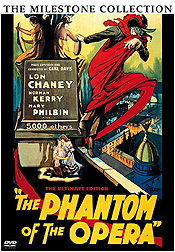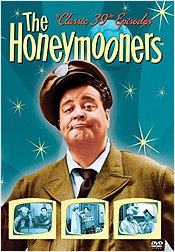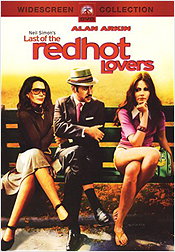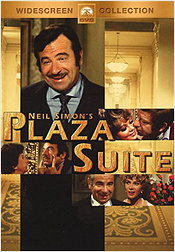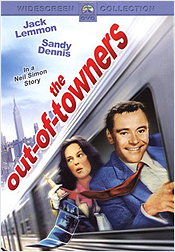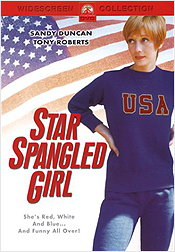 |
Site created 12/15/97.

page created: 12/23/03
 Barrie Maxwell - Main Page |
||||
| Christmas
Classics and a Few Reviews We all have our favourite classic Christmas movies and some of them are even on DVD! In this final column of 2003, I run down the DVD status of Christmas films made prior to the 1960s. This time out, I also have eleven new reviews (The Phantom of the Opera from Milestone; The Looking Glass War and Ship of Fools from Columbia; He Walked by Night, Crime of Passion, and Odds Against Tomorrow from MGM; and Last of the Red Hot Lovers, Plaza Suite, The Out-of-Towners, Star Spangled Girl, and The Honeymooners: "Classic 39" Episodes from Paramount) and the usual rundown of new classic release announcements. Christmas Classics If we look back over the films made before the 1960s, there are actually several hundred of them in which Christmas makes an appearance if only briefly. Most of these films have never developed any enduring reputation as a Christmas film, but a few have (mainly because they were major productions or were vehicles by well-loved and respected stars) and we often see them revived at this time of year. Some of the best known are Babes in Toyland (1934, Hal Roach); Heidi (1937, Fox); Holiday Inn (1942, Paramount); Going My Way (1944, Paramount) and by association The Bells of St. Mary's (1945, RKO); Meet Me in St. Louis (1945, MGM); It's a Wonderful Life (1947, RKO); The Bishop's Wife (1948, Goldwyn); and An Affair to Remember (1957, Fox). Purely Christmas films are definitely fewer in number. This is understandable. After all, the temporal window of opportunity for any such film to get an audience and make money is short, and only if the film has merit and can so generate profitable reissues is it likely to become an enduring classic. Various film versions of Charles Dickens's "A Christmas Carol" fall into this category, as do such items as Christmas in Connecticut (1945, WB); Miracle on 34th Street (1947, Fox); and White Christmas (1954, Paramount). A few of the purely Christmas classic films of merit do tend to get forgotten in the shuffle of time and the glut of more contemporary Christmas titles. Sometimes the problem is that the film's theme has a somewhat darker nature than we are looking for from a Christmas title. An excellent example is 1952's British film The Holly and the Ivy. Overall, it seems as though the 1940s offer the largest number of enduring Christmas titles - perhaps something to do with the desire for family values and the comforts offered by traditional Christmas celebrations in times of war and reconstruction. Herewith, a rundown on the DVD status of a number of Christmas or Christmas-oriented films and cartoons that first appeared mainly during the 1930s to 1950s. Note that several biblical epics depicting the birth of Christ are not included in this listing. Silent A Christmas Past - This is a recently released DVD from Kino that consists of nine short silent Christmas movies mainly produced during the years 1901 to 1915. Included are Holiday Pageant at Home (1901); The Night Before Christmas (1905); Winter Straw Ride (1906, women get the upper hand in a snowball fight); A Trap for Santa (1909, D.W Griffith); A Christmas Carol (1910, Dickens much abridged); A Christmas Accident (1912, a grocery order goes astray); Adventures of the Wrong Santa Claus (1914, mixed-up Santas, a robbery and a chase provide good fun); Santa Claus Vs. Cupid (1915, a girl has two different suitors dressed up as Santa); and Santa Claus (1925, filmed in Alaska). The disc provides a fascinating look at how Christmas was portrayed almost a century ago. The image quality is mainly quite good except for Santa Claus and The Night Before Christmas. The musical accompaniment is merely okay - perhaps a little melancholy for what should be a happy time of year. The 1930s Little Women (1933, RKO) - This filming of the Louisa May Alcott story (starring Katharine Hepburn, Joan Bennett, and Paul Lukas) has a Christmas feel to it although Christmas is only an incidental part of the story. WB issued a superior DVD version of this title in late 2002. Recommended. Cute Cavalcade of Classic Christmas Cartoons (1933-1959) - Whirlwind Media offers a 90-minute collection of sound cartoons with a Christmas theme on DVD. Eleven cartoons are included: Shanty where Santy Claus Lives (1933), Jack Frost (1934), Somewhere in Dreamland (1936), Christmas Comes But Once A Year (1936), Christmas Night (1938), Rudolph, the Red-Nosed Reindeer (1941), Hector's Hectic Life (1948), Snow Foolin' (1949), Gift Wrapped (1952), Santa's Surprise (1957), and Nobozodhee (Russian - 1959). This is quite an interesting collection with some nice Max Fleischer material included such as Somewhere in Dreamland and Rudolph, the Red-Nosed Reindeer. The problem is that it's all presumably public domain material and in pretty rough shape, looking little better than it did on VHS. Poor contrast, jiggle, speckling, and scratches are the order of the day, not to mention a noisy sound track. Cartoon Crazys: Christmas (1933-1954) - Winstar (now Wellspring) put out this collection of 13 public domain cartoons which duplicates some of the Cute Cavalcade items. The individual items are: Christmas Night (1933), Hugh Harman and Rudolph Ising's Shanty where Santy Clause Lives (1933), A Waif's Christmas Welcome (1936), Rudolf Ising's The Pup's Christmas (1936), Dave and Max Fleischer's Hawaiian Birds Christmas (1936), Dave Fleischer's Christmas Comes but Once a Year (1936), Friz Freleng's Fresh Hare (1942), Santa's Surprise (1947), Max Fleischer's Rudolph, the Red-Nosed Reindeer (1948), The Christmas Circus (1949), Snow Foolin' (1949), Tarts and Flowers (1950), and Private Eye Popeye (1954). The image quality is not bad for public domain material and Winstar has jazzed up the sound somewhat, although it's very much an individual taste whether you'll like it or not. Notes on each cartoon are included. This title may be out of print now, but I have seen the odd copy still available in stores. Babes in Toyland (1934, Hal Roach) - Laurel and Hardy star in this fantasy tale inspired by a Victor Herbert operetta. An example of a non-Christmas film that gets unearthed at Christmas time because its themes are in keeping with the season. One of the few black and white films whose colourization is not a disaster - available on DVD from Good Times and looking very good. If you want a good black and white version, you'll have to look to the Kinowelt R2 release. (The film is also known as March of the Wooden Soldiers.) Scrooge (1935, British) - A 78-minute version of the Dickens classic starring Sir Seymour Hicks as Ebenezer Scrooge. For the most part, this is an interesting interpretation that really conveys the flavour of the times that the story is set in. It's not quite as impressive as the later Alastair Sim version, but there are interesting variations in how the material is presented and different aspects of the story are emphasized. It's definitely worth seeing if you get a chance. A couple of versions are available on DVD. The best one is Image's release of the full 78-minute version. The source material is far from pristine, but it is quite watchable, although the audio requires some patience. Much less desirable is Marengo Films' release, which is a truncated version of 61 minutes duration that's available as one half of a Christmas double bill. (The other half is 1940's Beyond Tomorrow, about which more later.) Marengo's Scrooge - aside from missing an obvious chunk of material - is in pretty rough shape. Interiors are tolerable, but exteriors are almost impossible to make out at times. Speckling and scratches are rampant, and the sound is a struggle. The film is also available as a bargain basement title from Front Row, but I have not viewed it. Three Godfathers (1936, MGM) - A thinly disguised retelling of the birth of Christ with a western setting. Filmed many times, this version starred Chester Morris, Lewis Stone and Walter Brennan. It's not available on DVD; rights are held by WB. A 1948 MGM version was made by John Ford with John Wayne and will be forthcoming on DVD from WB in 2004. Heidi (1937, Fox) - Many of the Shirley Temple films have a Christmas dimension to them and perhaps Heidi as much as any with its lasting images of the smashed snow dome and the sleigh chase. The film appeared on DVD almost two years ago, with both the original black and white and colourized versions on the same disc. This is just about the poorest effort amongst all the DVDs that Fox has released to date and is definitely not recommended. (The edge enhancement is so pronounced that the film is virtually unwatchable.) Rebecca of Sunnybrook Farm (1938) and Stowaway (1936) also have some Christmas elements, but neither is scheduled as yet by Fox for DVD. Both were previously available on laserdisc and VHS. A Christmas Carol (1938, MGM) - I consider this to be one of the lesser versions of the Dickens classic, particularly in respect to its adherence to the original text. Reginald Owen stars as Scrooge (Lionel Barrymore was originally cast, but prevented from participating by ill-health) and Gene Lockhart plays Bob Cratchit. The film is not available on DVD. WB holds the rights. Previously available on laserdisc and VHS. The 1940s Beyond Tomorrow (1940, RKO) - Christmas Eve sees three businessmen act as catalysts to bring two young people together, but the story soon leaves Christmas behind and becomes a more standard boy-loses-girl, boy-finds-girl tale but with a fantasy twist that maintains the spirit of Christmas. Charles Winninger, Harry Carey, and C. Aubrey Smith star as the three elderly men in what is a reasonably entertaining film. This is a public domain title available on DVD from Marengo Films as part of a double bill (with Scrooge [1935] - see above). It's tolerable-looking despite numerous age-related imperfections and annoying vertical lines that appear on and off during the initial and final sections of the film. Despite the transfer difficulties with both films on this double-bill DVD, the opportunity to get the two rare titles together at a modest price makes the DVD worth picking up. The film is also available from VCI, but I have not seen that version. Remember the Night (1940, Paramount) - I don't know why this fine film doesn't get more play for it's definitely a Christmas/New Year's film with the added bonus of the attractive combination of Fred MacMurray and Barbara Stanwyck in the lead roles. From a script by Preston Sturges. Not on DVD. Universal holds the rights. Previously available on VHS. The Shop around the Corner (1940, MGM) - James Stewart and Margaret Stewart star in this pleasant concoction from Ernst Lubitsch (remade twice, most recently as the inferior You've Got Mail). Not strictly a Christmas film, but the story does reach its climax on Christmas Eve. WB issued a very nice DVD version that is highly recommended. The Man Who Came to Dinner (1942, WB) - Monte Woolley is the man of the title who slips on the ice and ends up an unwanted houseguest at a small-town home over Christmas. With Bette Davis and Ann Sheridan, this is a delightful romp that seems to have been forgotten as a Christmas revival item. Not on DVD. WB holds the rights. Previously available on laserdisc and VHS. Holiday Inn (1942, Paramount) - Now this one does get lots of Christmas play even though Christmas only makes up about a tenth of the film. Bing Crosby and Fred Astaire star in the story of a man who starts up an inn that only opens for holidays, with Bing introducing the Irving Berlin song "White Christmas". Available on DVD from Universal as part of a double bill disc with Going My Way (see below). The transfer is pretty good, despite the lack of any restoration, and with a second feature included, definitely worth picking up. Christmas Holiday (1944, Universal) - The title can be a little misleading, for although the film starts and ends during the Christmas season, a large part of the film is devoted to a flashback that is decidedly non-Christmas-like. Deanna Durbin and Gene Kelly star in another seldom-revived film. Not on DVD. Universal holds rights. Going My Way (1944, Paramount) - Bing Crosby stars as a young priest assigned to revitalize the church headed by an elderly pastor (Barry Fitzgerald). Curiously, this film is frequently trotted out at Christmas even though it has nothing to do with the season per se. The general warmth and joy it engenders is probably what makes it such a good Christmas fit. Available on DVD from Universal as part of a double-bill disc with Holiday Inn. Another good transfer makes this double-bill disc worth having. Bells of St. Mary's (1945, RKO) - Another film that has no Christmas theme, but by virtue of being a sequel to Going My Way tends to get airings over the Christmas season. Bing Crosby and Ingrid Bergman star in a pleasant film that doesn't quite match the quality of the original (as most sequels don't). Available on DVD from Artisan (Republic) in quite a good transfer, although not the equal of It's a Wonderful Life. Worth having either separately or as part of the Christmas box set that includes the latter film also. Christmas in Connecticut (1945, WB) - Great Christmas Eve fare with Barbara Stanwyck, Dennis Morgan, and Sidney Greenstreet. Stanwyck is a chic newspaper columnist who has to pretend to be the perfect homemaker for returning soldier Morgan. (There was an unfortunate 1992 remake directed by governor Schwarzenegger.) Not on DVD. WB holds rights. Previously available on laserdisc and VHS. The Cheaters (1945, Republic) - A virtually unknown Christmas tale about a has-been actor invited to Christmas dinner by a rich family. Joseph Schildkraut, Billie Burke and Eugene Pallette star in a heart-warming story that originated surprisingly from Republic Studio. Not on DVD. Rights presumably held by Artisan. (The film is also sometimes known as The Castaway.) Meet Me in St. Louis (1945, MGM) - The famous Judy Garland film in which she sings "Have Yourself a Merry Little Christmas". Not strictly a Christmas film, but one often associated with the season. Forthcoming on DVD from WB in April 2004. Previously available on laserdisc and VHS. It's a Wonderful Life (1946, RKO) - A Christmas tradition, even though, once again, the film's not strictly a Christmas item. James Stewart and Donna Reed with the standard Frank Capra supporting cast of Hollywood regulars. Available on DVD from Artisan and highly recommended. Christmas Eve (1947, UA) - A film that devotes most of its running time to tracking down the whereabouts of the three sons of a woman in danger of losing control over her estate, culminating in a Christmas Eve reunion. George Raft, Randolph Scott, and Joan Blondell head the cast in a seldom seen but interesting film. Believed to be in the public domain. Not on DVD. Rights presumably held by MGM. (Film also known as Sinner's Holiday.) Miracle on 34th Street (1947, Fox) - One of the most commonly revived Christmas films, this version starred John Payne, Maureen O'Hara, and Edmund Gwenn. This is the famous tale of the Macy's Santa who goes on trial to prove he's the real Santa. Remade several times, most recently with Richard Attenborough, but the original remains the best version. Available on DVD from Fox in a fine-looking transfer and recommended. The Bishop's Wife (1948, Goldwyn) - A suave angel (Cary Grant, who else) helps a bishop (David Niven) and his wife (Loretta Young) raise money for a church in this enduring Christmas fantasy. Available on DVD from MGM in a very fine transfer and recommended. Holiday Affair (1949, RKO) - A widow is courted by two suitors at Christmas time. Entertaining holiday fare with Robert Mitchum, Wendell Corey and Janet Leigh. Not available on DVD. Rights held by WB. Previously available on VHS. Little Women (1949, MGM) - A typically glossy MGM product and a remake of the 1933 film that falls a little short due to some poor casting choices. Still, it's bright and colourful and very much in the Christmas spirit, even if it has little to do with Christmas per se. Available on DVD from WB and recommended. Mr. Soft Touch (1949, Columbia) - Glenn Ford and Evelyn Keyes star in this pleasant, if slight, romance between a gangster and a social worker that all takes place in the days leading up to Christmas. Not on DVD. Rights held by Columbia. The 1950s The Great Rupert (1950, Eagle-Lion) - With a partial Christmas theme, this film fits the holiday spirit nicely. It was George Pal's first feature length film and told the story of a squirrel that manages to inadvertently aid a struggling family of circus performers. It's available on DVD under the title A Christmas Wish in a reasonable looking black and white version from Fox. Included is a colourized version accompanied by an audio commentary by one of the film's stars, Terry Moore. Trail of Robin Hood (1950, Republic) - For die-hard western fans, how about Roy Rogers making sure that poor families don't suffer at the hands of a big business that wants to raise Christmas tree prices. An enjoyable B also featuring a number of Republic's western stars of the time (Rex Allen, Allan Rocky Lane, Monte Hale). Not on DVD. Artisan holds the rights. A Christmas Carol (1951, British), original British title, Scrooge - This remains the definitive version of the Dickens classic. Alastair Sim makes for a perfect Scrooge. Available on DVD from VCI. The disc contains both the original black and white and colourized versions. This is probably worth having even though the image transfer sports numerous imperfections. Barring a complete restoration, an improved version seems unlikely. The inclusion of Max Fleischer's 1944 cartoon Rudolph the Red-Nosed Reindeer also provides a nice inducement. The Holly and the Ivy (1952, British) - A small-town British cleric learns the truth about his three children during a Christmas visit by them. This is a very-finely acted (Ralph Richardson, Celia Johnson) drama that presents a sobering account of family relations yet leavened with touches of humour. Well worth watching if it shows up on television. Not available on DVD. White Christmas (1954, Paramount) - This film is a reworking of Holiday Inn that falls a little short of the original. Bing Crosby, Danny Kaye and Rosemary Clooney star in what has become a perennial Christmas offering. Available on DVD from Paramount in a very fine transfer with a few nice supplements. Recommended. An Affair to Remember (1957, Fox) - Cary Grant and Deborah Kerr star in this oft-filmed tale of a shipboard romance that leads to an agreement between the couple to meet a year later - in this version, at Christmas. Another example of a film that's not a Christmas picture, but seems to go with the season. The 1957 version is fairly entertaining, although not quite as effective as the 1939 one entitled Love Affair. Available on DVD from Fox in a fine-looking transfer with some good supplements. Part of the Studio Classics series. Recommended. Reviews The Phantom of the Opera (1925) (released on DVD by Milestone on September 9th, 2003) I have no intention of going into any great analysis of this film. After all, The Phantom of the Opera is one of the most well-known silent titles extant and several of its images are burned into the memories of anyone who calls themselves a film enthusiast. It is of course the definitive Lon Chaney version of a story that has seen numerous filmings over the years, including at least half a dozen sound versions for either the big screen or television. Although the silent version has already been available on DVD from several sources, it's safe to say that we now have a definitive DVD release available to us courtesy of Milestone Film and Video (distributed by Image). Milestone's two-disc Ultimate Edition of The Phantom of the Opera truly lives up to its name. |
||||
| Three
audio tracks are provided. The first contains an orchestral score by
Carl Davis dynamically presented in Dolby Digital 2.0 surround with
some quite effective use of the rear channels. The second is the
original mono sound track (actually the track used for the 1930
international release version since that's the only sound track in
existence) which is quite workable although the after-the-fact
addition of sound is not completely persuasive as one might expect.
On the third audio track, Scott MacQueen presents an excellent
commentary that in an entertaining fashion tells you everything
there is to know about the film's various incarnations, the cast and
crew, and production details. The other supplements on Disc One are
the 1925 and 1929 theatrical trailers, ten sets of still and poster
galleries including deleted and missing scenes from several of the
early premiere versions of the film and Universal's approach to
marketing the film, and nine selections of 1930 dialogue sequences
not used in the restored version. Disc Two presents the 1925 release version of the film. This has not been restored and consequently looks very rough compared to the Photoplay 1929 version. Scratches, speckles, and evidence of decomposition are ample and the image lacks sharpness. After the experience of the first disc, it's a tougher proposition to put up with, but the experience is somewhat redeemed by a wonderful score by Jon Mirsalis presented in Dolby Digital 2.0 stereo. This disc's supplementary material includes a recent video interview with Carla Laemmle (producer Carl Laemmle's niece) who was a lead ballerina in the original film, a 1973 audio interview with Charles Van Enger who was a cinematographer for the film, and a "Faust" opera extract from the 1929 Tiffany sound feature Midstream. This Phantom DVD package, drawing on the excellent efforts of Photoplay Productions, is a real labour of love on the part of Milestone and is worthy of any film lover's attention. Highly recommended. The Honeymooners: "Classic 39" Episodes (released on DVD by Paramount on November 4th, 2003) The original Honeymooners episodes need little introduction. On television virtually continuously somewhere in the world ever since they first aired in 1955-56, the series' characters are familiar to nearly everyone who has turned on a television set. The series originated as short sketches in 1950 on Jackie Gleason's first TV show, Cavalcade of Stars. At first, there was just Jackie Gleason playing bus driver Ralph Kramden and Pert Kelton playing his wife, Alice. Art Carney, playing upstairs neighbor and sewer worker Ed Norton, soon joined them. In 1952, Gleason moved his show over to CBS and Audrey Meadows replaced Kelton as Alice Kramden. Joyce Randolph played Ed's wife, Trixie. Gleason's show soon became known as The Jackie Gleason Show and by 1955, Honeymooners sketches were taking up more and more of the hour-long program. Gleason struck a deal with Buick to produce 78 half-hour Honeymooners episodes for the 1955-56 and 1956-57 seasons, but poor scheduling of the show during the first season reduced its popularity. As a result, Gleason cancelled his deal with Buick, which is why there were only 39 episodes made. The characters did not disappear, however, as Gleason resurrected them in later incarnations of his television variety shows although only Art Carney continued in his supporting role. Audrey Meadows, for example, was replaced by Sheila MacRae. |
||||
| Paramount
(on behalf of CBS DVD) has packaged The
Honeymooners in a box set attractively comprising five
slim cases. Each of the first four cases contains eight episodes,
with the fifth containing the last seven and some supplementary
material. The latter is a little thin, but considering we've got all
39 episodes in one package, there's not much to complain about. We
get a 20-odd minute documentary hosted by Audrey Meadows that
provides interesting background on the series and includes some
interviews with the stars. This is an abridged version of the 1990
Honeymooners Anniversary Special.
Also included are the original show openings and a couple of
examples of the show closings, all featuring the show's sponsor,
Buick. As for the look of the episodes, considering the shape in
which they are usually available on television, their transfers here
(full frame, as is appropriate) are just fine. Sure there's
variability in quality from one episode to another and there's
certainly evidence of scratches and dirt, but overall the material
is sharp and clear with reasonably deep blacks. The mono sound is
entirely adequate with hiss minimal and no major distortion.
Recommended. Last of the Red Hot Lovers (1972) Plaza Suite (1971) The Out-of-Towners (1970) Star Spangled Girl (1971) (all released on DVD by Paramount on November 25th, 2003) The good, the fair, the bad, and the ugly. I guess you have to try to please everyone when you make decisions on which titles to release on DVD. Presumably that was the idea when Paramount recently brought out these four films, all of which were based on plays or stories by Neil Simon. Unfortunately, The Odd Couple, or The Goodbye Girl, or even Prisoner of Second Avenue these are not. Instead, they're all selections from the lower half of the Simon oevre and only one offers sustained entertainment value. What the others provide is chiefly tedium. The main characters in three of these films are variously loud, abrasive, or stubborn, but above all annoying and distinctly unfunny. Star Spangled Girl is the worst of the four, but only by a small amount over The Out-of-Towners. Plaza Suite is marginally better. Only The Last of the Red Hot Lovers can actually be sat through in a single go, and it's the only one with any repeat viewing value. |
||||
|
||||
So let's start with the good. The Last of the Red Hot Lovers at least offers a very nice Alan Arkin performance as a seafood restauranteur, married with children, who has reached his mid-40s and wonders whether he has missed something in life by never having had an affair. He attempts to address the situation by arranging liaisons with three different women in his mother's apartment, but all the women turn out to have difficulties of their own. There's a degree of stereotype to each of them - the promiscuous foreign woman, the air-headed would-be performer/flower child, and the neurotic, cheated-upon housewife - but that's obviously intentional and each is brought effectively to life by Sally Kellerman, Paula Prentice, and Renee Taylor respectively. The key is Arkin, however, who delivers a marvelous portrait of the furtive, meticulously prepared, and fastidious (always treating his hands to get rid of the smell of fish) would-be lover who comes full-circle in the course of his three pursuits. In the first one, he's hesitant - disconcerted by the woman's desire to get on with things. By the time the third one arrives, he's hot to trot but finds now that the woman is hesitant. The characters are all well-drawn and if it becomes clear early on that our hero seems unlikely to actually consummate any of the affairs, it's not really a problem because each liaison is not allowed to become tiresome and little time is wasted setting up the next possibility. On to the merely fair. Plaza Suite presents three separate stories linked by two facts - they all take place in the same hotel room, and all star Walter Matthau. The problem with this film is that the characters that Matthau portrays are either sleaze-balls or jerks who need a good kick in the ass. In sleaze-ball mode, he plays a Hollywood producer who attempts to seduce a former girlfriend whom he has persuaded to meet him in his hotel room. This is actually the poorest of the three episodes because it just falls flat - everything progresses to an obvious conclusion with no surprises at all along the way. In the other two episodes, Matthau is a married man whose wives you feel sorry for. He's either an indifferent husband who's having an affair on the side while his wife tries to interest him in their anniversary or an obnoxious husband with a reluctant bride-to-be who deals with people as though they're put on Earth solely to please him. There's no doubt Matthau is good at these sorts of characterizations, but do we really want to see and listen to three of them at one go? Were it not for the fine work of the three actresses that co-star with him (Maureen Stapleton, Barbara Harris, and Lee Grant), this film would be a complete disappointment. A "delightful comedy" as the DVD case suggests? Hardly, there's barely a smile elicited by anything we see on the screen. Now for the bad. In The Out-of-Towners, Jack Lemmon has one of his most obnoxious portrayals on film. He plays a businessman who has been summoned to New York from the mid-west for a morning meeting at which he will be offered a promotion. He and his wife take a plane the previous afternoon so as to arrive in good time, but nothing cooperates - flight delayed, plane rerouted, lost luggage, hotel reservation cancelled, etc. All the time our hero is complaining, or blaming his wife, or denying that anything is due to his own bad decision-making. Handled with a deft touch, there is potential for the whole situation to make for an amusing film, but Lemmon instead ladles it on with a trowel - constantly in our faces with his bad-tempered, self-centred, loud and abrasive portrayal. Almost as annoying is Sandy Dennis's milquetoast wife who is equally annoying but in the opposite sense. There should be laughs or at least a snicker or two to be had here, but alas there are none. If the film's premise appeals to you, you're better off seeking out the 1999 remake with Steve Martin in the Lemmon role. And finally, the ugly. At the bottom of this particular barrel is Star Spangled Girl. This is a catastrophe of boredom with a story, for what it's worth, that concerns a wide-eyed, perky girl who hopes to become an Olympic athlete. She comes to Los Angeles to train and a boy-girl-boy triangle develops between her and two neighbours who write and publish an underground newspaper. Sandy Duncan is the Olympic hopeful while Tony Roberts and Tod Susman are the two guys sharing accommodations next to where she lives. I guess Duncan and Roberts may be okay in the film, but it's hard to notice because their efforts are obscured by a performance by Tod Susman that has to be seen to be believed for its utter inanity and annoyance. Experiencing his efforts here is like listening to chalk screech across a blackboard for an hour and a half. There's not the hint of a laugh to be gleaned from this film either. In fact, you'll get more entertainment from watching clothes spinning in a washer. You've got to hand it to Paramount, though. No matter how bad the film, they at least try to make it look its best on DVD and there are no exceptions to that here. Oh perhaps The Last of the Red Hot Lovers has some noticeable edge effects at times, but otherwise these transfers are of a piece. All are 1.85:1 anamorphic efforts that look realistically colourful and are generally free of any significant debris or major scratches. Some minor speckling is present, but not an issue of concern. Shadow detail is very good and black levels are satisfyingly deep. All have English mono sound tracks that deliver the dialogue-driven films clearly. English subtitles are available on all and French mono tracks are provided on all but Star Spangled Girl. There are no supplements whatsoever on any of the discs. |
On to Part Two
Barrie Maxwell - Main Page
 |
| Site
designed for 1024 x 768 resolution, using 16M colors and .gif 89a
animation. © 1997-2015 The Digital Bits, Inc., All Rights Reserved. billhunt@thedigitalbits.com |
